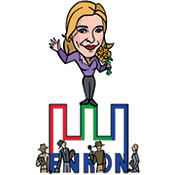
If journalism were in the Olympics, the Enron story might well be pairs figure skating. Bethany McLean, the young Fortune writer who first wrote about Enron’s shady finances a year ago, has, of course, already been awarded the gold. And with that have come the requisite endorsements: In the past two months, she was hired as a consultant by NBC News and shared in a $1.4 million deal to co-author a book on the scandal.
But another team is also vying for top honors – amid complaints about shoddy judging. Reporters and editors at the Wall Street Journal believe their work has been unjustly ignored, with some wondering whether Pulitzer rivals like the Washington Post and the New York Times have gone out of their way to praise McLean.
“Enron did not collapse under its own weight,” says Jonathan Friedland, the Journal editor who’s been in charge of much of the paper’s Enron coverage. “Without our reporting, I don’t think any of this would have happened.”
In response, McLean’s former editor at Fortune and current Time Inc. editorial director John Huey says, “Bethany was the first journalist in a widely respected national publication to suggest that the emperor at Enron had no clothes.” (Not that her own publication took much note: Fortune had to airbrush out Kenneth Lay from a November SMARTEST PEOPLE WE KNOW cover photo.)
Let’s recap: In September 2000, Jonathan Weil wrote a long story for the now-defunct Texas edition of the Journal about odd accounting at various Texas-based energy traders; it included four paragraphs on Enron. James Chanos, a well-known short-seller who was one of the first to start unloading Enron stock, says he got interested in the company after reading Weil’s piece.
Almost six months later, in March 2001, the then 30-year-old McLean (who Times columnist Maureen Dowd has suggested will be played by Alicia Silverstone in the inevitable movie) wrote her little-noticed 2,400-word story, “Is Enron Overpriced?”
Then, in October, the Journal ran a three-day series by Rebecca Smith and John Emshwiller detailing Enron’s unorthodox partnerships. Their articles are seen by many on Wall Street as ultimately sinking the company.
Weil’s partisans think he should get credit for crossing the finish line first (an item, “Credit Due,” ran in “Page Six” recently). But even Chanos says that “Bethany’s piece was the first one to raise really specific questions.”
Most of the Journal’s brain trust, though, are plugging Smith and Emshwiller, who, of course, wrote their stories in 2001 and are thus eligible for this year’s Pulitzers.
“The Fortune story basically said this is a company that nobody understands,” says Journal deputy managing editor Daniel Hertzberg. “It didn’t show what was wrong with the company. It took Becky and John to do that.”
That’s the competition. Now for the judging. In January, Howard Kurtz, the Washington Post’s media writer, highlighted McLean as the first journalist to ask questions about Enron. Ten days later, the Times’ Felicity Barringer wrote her profile of “the financial reporter everyone loves to lionize.”
While McLean was being anointed as a journalistic sex symbol in a story hitherto dominated by a balding Kenneth Lay, folks at the Journal felt they were being robbed: “People are trying to queer the Pulitzer pitch for the Journal,” says one editor there. That’s sour grapes, counters Kurtz: “In this case, a 31-year-old reporter beat them and the rest of the world by a considerable margin.”
In a bit of circular logic endemic to media reporters, Kurtz adds, “I must have been onto something, since after my piece appeared, she was profiled in the Times, given a contract by NBC, and offered a book deal.”
As for McLean, she seems slightly embarrassed by all the attention. “I’ve told people I’ve gotten too much credit,” she says. “I did raise alarm bells, but I didn’t know the half of it.”